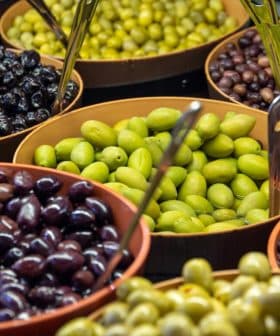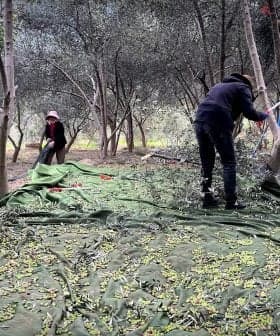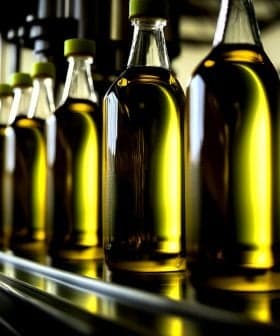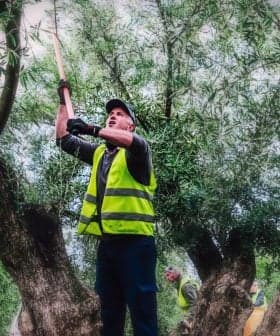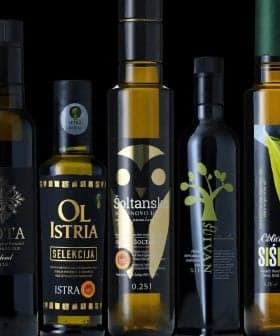Upstart Belgian Importer Stakes Claim on the World Stage
The founders of ASUR source award-winning oils from Greece to sell in Belgium and the Netherlands, facing challenges associated with nascent olive oil markets.
 Tom Suring co-founded ASUR to bring high-quality extra virgin olive oil to Belgium and the Netherlands. (Photo: ASUR)
Tom Suring co-founded ASUR to bring high-quality extra virgin olive oil to Belgium and the Netherlands. (Photo: ASUR) Belgium, known for chocolate and the Battle of Waterloo, is also a significant consumer of olive oil, ranking third among non-producing countries in the EU. ASUR, a Belgian importer, has sourced high-quality extra virgin olive oil from Greece and aims to educate consumers about the value of investing in good quality olive oil.
Known for its chocolate, the European Commission and site of the famed Battle of Waterloo, Belgium and extra virgin olive oil are far from synonymous.
However, the eighth-largest country (by population) in the 27-member European Union is also the eighth-largest olive oil consumer in the bloc and the third-largest non-producing consumer country.
The market for high-quality olive oil in Belgium and the Netherlands is indeed a specialized niche, presenting a unique set of challenges when it comes to acquiring clients
According to International Olive Council data, Belgium’s 11.7 million population consumed an estimated 13,000 tons of olive oil in the 2022/23 crop year. Of non-producing countries, only Germany and the Netherlands, which are significantly more populated, poured more olive oil.
Home to sizable diasporas from across the Mediterranean – Belgians of Italian and Moroccan descent make up two of the three largest groups of immigrants and their descendants – it is perhaps not so surprising that the Belgian importer ASUR managed to source one of the world’s best extra virgin olive oils in the 2022/23 crop year.
See Also:Producer Profiles“Our olive oil is crafted from olives grown in Greece, precisely within the vicinity of Ancient Olympia,” founder and owner Tom Suring told Olive Oil Times. “Here, the art of olive oil production thrives through a process characterized by meticulous attention to detail.”
“We use olives from carefully chosen olive groves, which are subject to year-round scrutiny by our agronomist, who ensures that the quality of our final product remains uncompromised,” he added.
The idea behind ASUR, which demonstrated its quality by winning a Gold Award for its medium-intensity Koroneiki at the 2023 NYIOOC World Olive Oil Competition, came after Suring traveled across southern Europe and realized the difference between the freshly produced extra virgin olive oil he sampled there compared to what he was used to purchasing in the supermarket back home.
“When traveling in southern Europe, I could taste the difference in quality and realized that the key to replicating the good flavors at home lay in using a superior oil full of authentic flavors that also delivered on its health benefits,” he said.
“Our objective was clear,” Suring added. “We wanted to offer more than a basic extra virgin olive oil. We aimed to provide a rich, flavorful olive oil that enhanced the dishes it was used in and could stand on its own.”
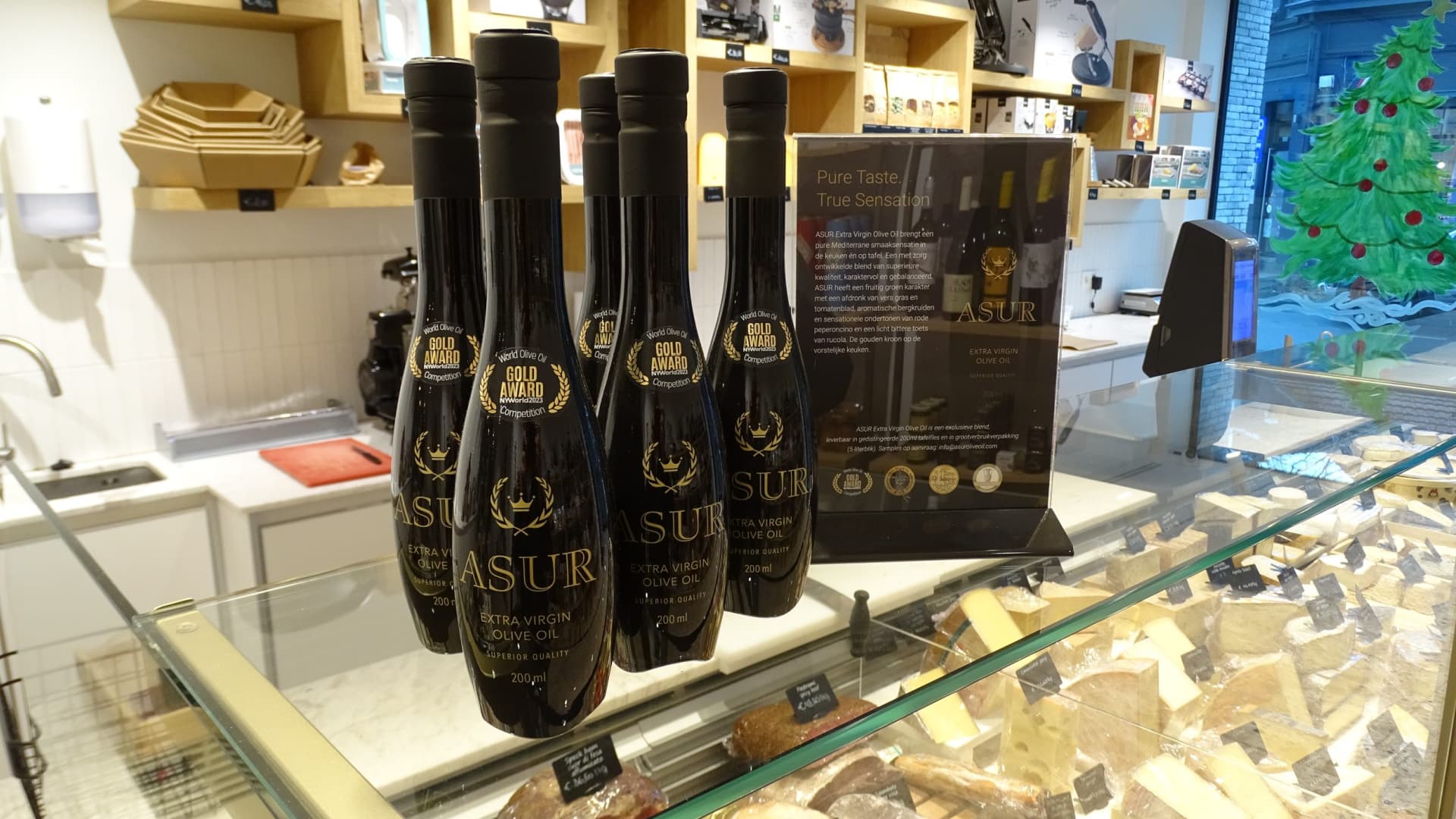
(Photo: ASUR)
Along with his founding partners, Suring finally settled on sourcing ASUR extra virgin olive oil from the Peloponnese after several visits and independent confirmation that some of the local farmers with whom they planned to work were producing consistently high-quality oils.
“We found partners with the quality we looked for,” he said. “Here, we can buy from local producers, and our experts follow up and ensure that the quality is up to our standards.”
“We have visited this region several times, and being sure that this area produces very high quality, we could make the extra virgin olive oil that gives the specific ASUR taste,” Suring added.
Like many producers in Greece, Suring said the 2023/24 crop year on the Peloponnese was not as good as the previous harvest.
“The 2023 season in Peloponnese is going relatively well,” he said. “We see some challenges, but these are mostly related to quantity, not quality, especially for those that harvest early. Our olives have already been harvested, and we are now working on blending the batches to obtain the best possible result for our clients.”
Overall, Suring cited water scarcity and increasingly unpredictable climate conditions as two of the most significant challenges faced by the farmers from whom he sources olive oil on the Peloponnese.
“Fortunately, our groves enjoy the advantage of being placed in areas ranging from 300 to 400 meters inland,” he said. “This elevated positioning has, so far, shielded us from the water scarcity concerns.”
While ASUR employs a team of experts to blend its extra virgin olive oils, Suring said one of the main challenges for importers in Belgium and the Netherlands is expanding extra virgin olive oil from a niche to a mainstream market.
“The market for high-quality olive oil in Belgium and the Netherlands is indeed a specialized niche, presenting a unique set of challenges when it comes to acquiring clients,” he said. “In the first year, we successfully established relations with renowned restaurants, hotels and gourmet stores. This year, which is the second year, we are well on track to increasing last year’s sales.”
Like many producers and importers in emerging olive oil markets, Suring said one of the biggest challenges the brand faces is consumer education regarding how high-quality olive oil should taste.
“In North Europe, there is a lot of defective olive oil sold because of a lack of knowledge about how a good and healthy olive oil should smell and taste,” Suring said. “Since the price is low, clients and customers accept this and purchase this olive oil.”
Echoing the thoughts of many producers interviewed by Olive Oil Times from every corner of the olive oil world, Suring said olive oil must follow in the footsteps of wine to develop a willingness to pay for high quality.
“Interestingly, while consumers wouldn’t settle for defective wine, they accept olive oil with defects,” he said. “However, I believe we are starting to witness a shift, and it does remind me of the transformation we have seen in the coffee industry.”
“I have also noticed the emergence of several young olive oil brands in the market, and I genuinely believe the market is big enough,” Suring added. “What is important for me is the ongoing mission of educating and convincing clients and consumers about the value of investing in good quality extra virgin olive oil. It is gratifying to see when our clients transform into our biggest promoters.”
Along with high quality, which Suring said is confirmed by winning awards from international quality competitions, ASUR also emphasizes presentation, investing in aesthetically pleasing packaging for its bottles and tins.
“We also made a deliberate choice to invest in a beautiful bottle that could find its place at every table,” Suring said. “High-quality and aesthetically pleasing products separate ASUR from other brands on the market.”
Looking ahead, Suring said he plans to expand ASUR’s operations into more countries but, for now, remains focused on solidifying its market position in Belgium and the Netherlands.
“In the next five to 10 years, we anticipate significant growth, solidifying our position as a thriving company with a substantial turnover in Belgium and the Netherlands and expanding into other European countries, including the Scandinavian countries,” Suring said
“However, in the upcoming year, our primary emphasis remains on strengthening our market position in Belgium and the Netherlands,” he added. “As a relatively young company, we need to make sure that we build a solid base before expanding into new markets.”
Share this article



